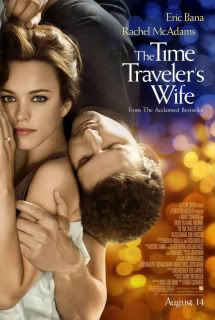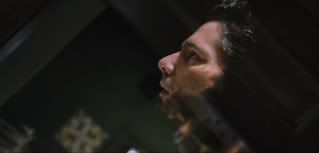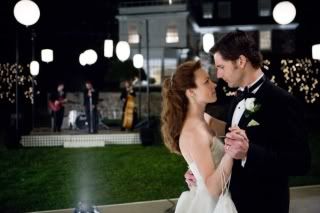If you've ever tried to figure out how to get your girlfriend to a sci-fi movie, or your boyfriend to a romantic drama, then you should probably check out The Time Traveler's Wife. They do this interesting thing where they take a pretty interesting love story, where a husband is away from home a lot, unexpectedly. It's a pretty common thing, I think. Lots of wives I'm sure have husbands that go on business trips occasionally, or the wives of cops have to deal with random emergencies, or doctors on call, or whatever. Not that big of a deal, right? Well, what if he was actually shunting around randomly in time involuntarily? Yeah, what about that? It means that you have a movie that's part drama, part science fiction, part romance, part existential out-of-order crazy movie that only barely makes sense when you really try to think about it.
I shouldn't make fun of it too much. I haven't read the novel yet, but I'll be borrowing it from my lady soon enough. Needless to say, she's read the book as well as seen the movie as of today, and I have to admit that it is a fairly excellent romantic drama (which I don't typically enjoy) and a fairly unique science fiction movie (which I do tend to enjoy). Of course, the nerd in me kept noticing various paradoxen, like I'm pretty sure you're not supposed to touch your past/future self, right? Something about the same entity existing in two places at once, but hey. I'm not a physicist. They did do a good job of animating/showing him traveling through time, which looks kind of like his body is dissolving, leaving behind any clothing he may be wearing. Often, we get audio-only clues that he's gone traveling (for example, he goes around a corner, and we hear the sound of clothes falling). Instant comedy!
The plot is simple and complicated. The story is told in something that resembles chronological order. Henry DeTamble (Bana) is a research librarian in Chicago, who meets Clare Abshire (McAdams) one day. She knows Henry, having met him when he was older and she was a little girl (the first of many complicated and possibly paradoxical occurrences). He visits her through various stages of her life, but once they meet in real chronological time, they spark a relationship (apparently an inevitable relationship). Throughout their relationship, he disappears for days or weeks at a time, visiting different periods in his own past, his future, and even beyond his own lifetime (breaking the cardinal rule of Quantum Leap). This causes stress in their marriage, as Clare feels lonesome (though she seems to have a good circle of friends, a fulfilling career as a painter, and a relatively normal life, otherwise) while Henry is "away."
While I can somewhat understand her loneliness and frustration, she seems (in the film) to forget that in order for her to know him in her own past (and younger versions of him in her present), as well as future versions, he needs to jump around in time. The longer he's away, the longer he may be there in another instance. Unfortunately, we never really get a sense of what he does when he's not pushed to a point involving Clare, and we only see him returning to the scene of an accident that killed his mother a few times (though in the book, so I hear, it's a very popular place with his various versions). We get some vague sense of the skills he needs to survive, like picking pockets, picking locks, fighting, and I'm sure a variety of other skills. Basically, once he arrives somewhen, he often needs to defend himself, steal clothing, and break into homes or buildings to keep from being attacked, starving, freezing, etc.
This film also tackles the idea of free will, and presents a "closed loop" of sorts. Henry is drawn to Clare throughout his travels, and is presented as a force "like gravity," and he's literally powerless to stop it. As a result, Clare falls in love with him at a young age, and spends virtually her entire conscious life in love with Henry. Is she important to him because she loves him more than anything? Does she love him more than anything because he's always been drawn to her, because she's important to him, because he's always been there? He also is seen teaching himself about a few things (like after the car accident that triggered what we see as his first time-travel, his future self is there to cover him in a blanket and explain what happened). I think the book will be interesting in its use of pronouns and tenses. "Oh, yeah, back when I was six? The you that you will become will have visited me," and so on and so forth. Each age-version of Henry seems to be regarded as a separate person (by Clare and other versions of Henry). That's interesting, too.
Also, on a quick note, Henry can travel through time because of a genetic condition. How crazy is that? He's like an X-Man or something. It's in his genes, which means he was born with it, and it evolved somehow. He passes it off to the child that he eventually has! I wonder why he doesn't get more extensive research done on him (I can definitely see military applications to master genetic-induced time travel). Basically, he has a small seizure and it causes him to shift out of the timestream and wash up somewhere else. They don't describe it that way in the movie (in fact they barely attempt to explain it at all), but I was kind of obsessing with the fact that he was a super-powered mutant instead.




No comments:
Post a Comment